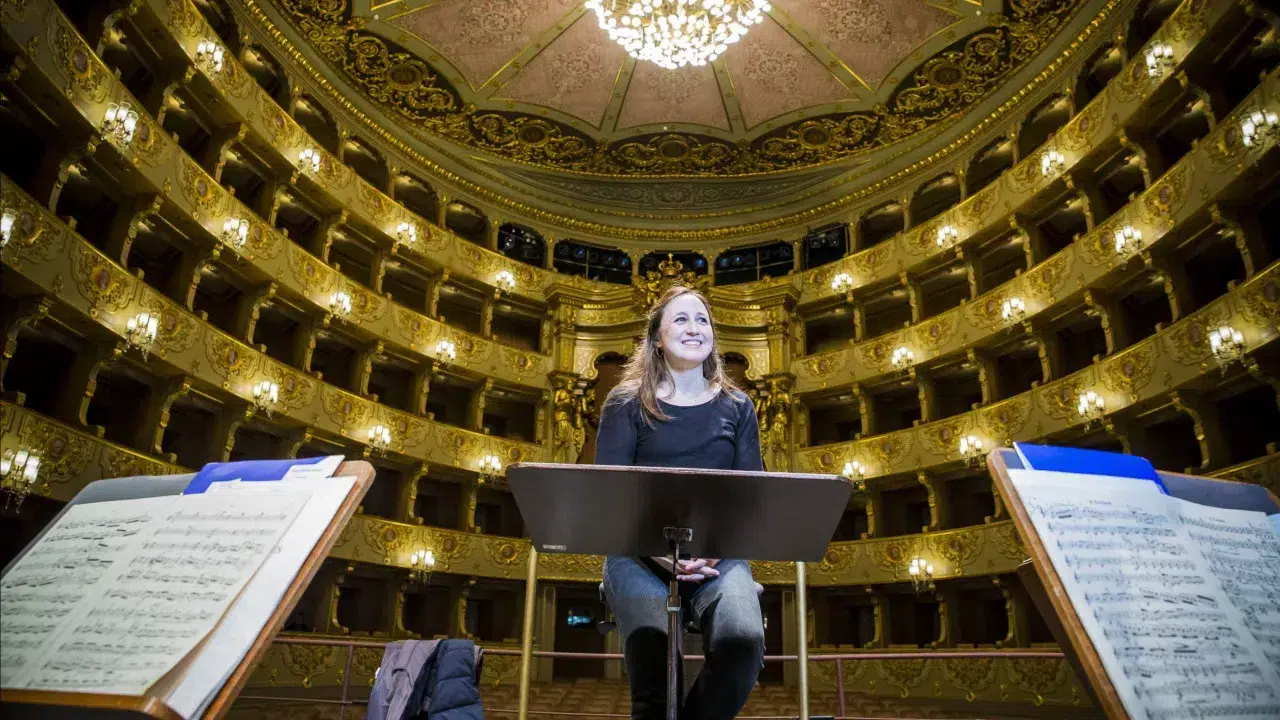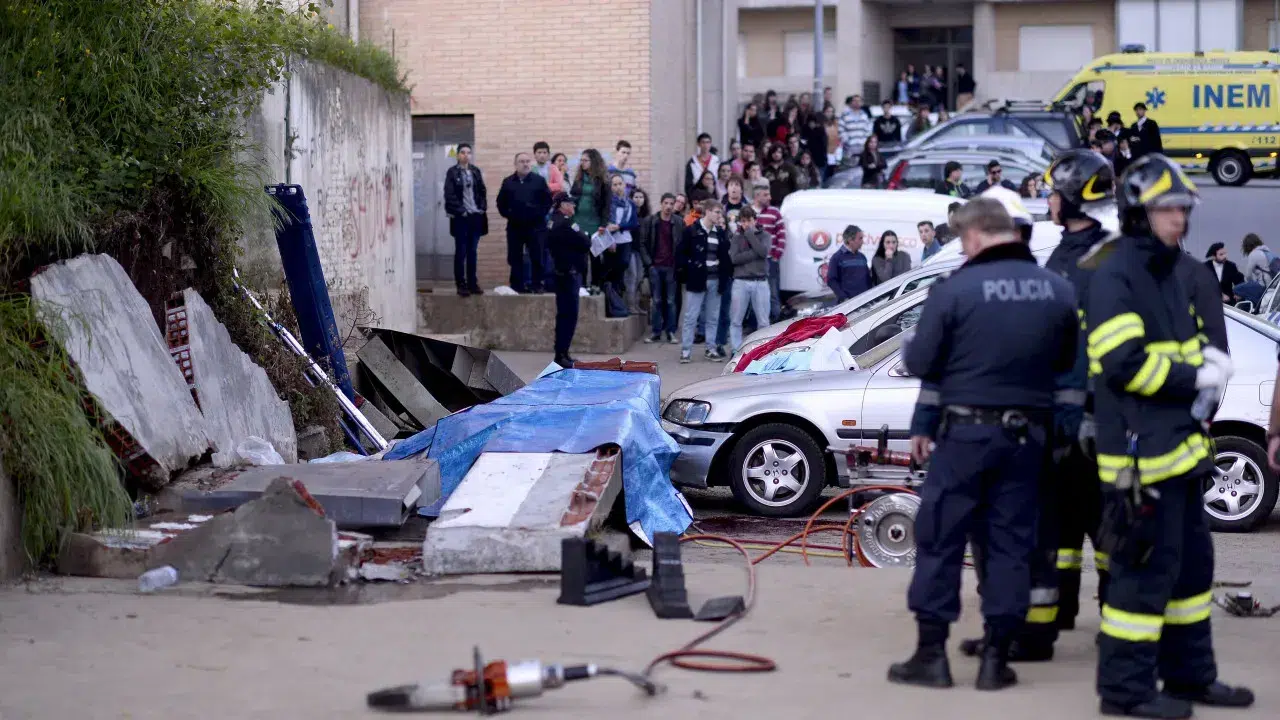
The musical, which blends influences and combines expressions such as jazz and blues while remaining true to its classical roots, will be presented in a concert version next Sunday at 6:00 PM at the Tivoli Theatre in Lisbon, and on the 28th at 9:30 PM at the Arts and Entertainment Center in Figueira da Foz.
In statements, the conductor referred to the OSP as her home. The cast includes baritones Luís Rodrigues and Diogo de Oliveira, as well as singers Lara Martins, Mário Redondo, and Sérgio Martins, and soprano Juliana Zara.
Joana Carneiro worked on this musical six years ago with the OSP and much of the cast, having invited soprano Juliana Zara for these two performances, with whom she worked in Scotland and whose voice she found “suitable” for the project.
“This musical is a good example of Leonard Bernstein’s imagination and genius as a composer. It is important to know the figure of Leonard Bernstein [1918-1990] as a conductor, pianist, a person very interested in the culture of a city like New York, a person with literary influences,” Joana Carneiro stated, adding that “the sources of inspiration [for the composer], from literature to New York culture, and the musical genres that are part of his imagination are also important.”
“In this work, we hear all of this. It is actually a good starting point to understand him. We hear jazz, blues, conga, swing, so many influences that also shine through in other works [by Bernstein], but ‘Wonderful Town’ is certainly a good example of the confluences of these traditions that are part of this composer’s genius.”
The musical reflects New York’s cosmopolitanism but also “speaks of the dream that so many people have when they arrive in a big city,” Joana Carneiro emphasizes. “New York is the big city where so many people go to try to succeed, it’s the ‘American dream’.”
The musical depicts the dream of two sisters, Ruth and Eileen Sherwood, who come from the state of Ohio to the big city to “give wings to their dreams, one as an actress, the other as a writer.”
“A narrative very easy to understand and relate to: overcoming barriers and meeting people,” commented the conductor.
It is rooted in the real story of the McKenney sisters, who in the 1930s moved from Columbus, Ohio, to New York to seek new opportunities.
Ruth dreamed of being a writer and wrote short autobiographical stories in The New Yorker magazine, which were collected in the book of short stories ‘My Sister Eileen’ (1938), about the adventures of the two sisters in Greenwich Village and the curious characters of the New York neighborhood where they lived. The work became a success and quickly reached the stage and the cinema.
‘Wonderful Town’, the musical, is based on the stage adaptation of McKenney’s stories by Joseph A. Fields and Jerome Chodorov. The success on Broadway in 1940 led to the first film version two years later, directed by Alexander Hall, with Rosalind Russell, maintaining the original title, ‘My Sister Eileen’.
The musical would debut in 1953, with a libretto by Betty Comden and Adolph Green, opening doors to new versions for film (‘There’s No Business Like Show Business’ by Richard Quine, in the Portuguese debut) and television, based on the original play. Bernstein’s musical, however, would stand out on its own.
The conductor highlighted that ‘Wonderful Town’, in addition to New York’s traditions, reflects Leonard Bernstein’s own music and the richness of his writing. As examples, she highlighted the operetta ‘Candide’, inspired by Voltaire’s classic, and the musical ‘West Side Story’, with a libretto by Stephen Sondheim, based on Arthur Laurents’ novel.
The conductor drew attention to Bernstein’s “sublime way of writing music and orchestrating.”
“When we look at this ‘Wonderful Town’, there is a simplicity and inevitability of the great composers. But behind this, there is a ‘craft’, a knowledge of what it is to play in an orchestra, what the orchestral instruments are, what it is to write for an orchestra and write for voice. This relates to all his experience not only in the field of musicals but also in opera and symphonic music,” emphasized Joana Carneiro.
Being a concert version for the Teatro Tivoli in Lisbon and the Arts and Entertainment Center in Figueira da Foz, Joana Carneiro stated that “some scenic aspects related to the narrative itself are added, and there are some spoken parts.”
Conductor Joana Carneiro, 48, is scheduled to conduct the Lisbon Metropolitan Orchestra on the 29th at the São Luiz Municipal Theatre in Lisbon, in a concert featuring pianist Gabriela Montero as a soloist, with a program including Gustav Holst’s “The Planets” and Armando José Fernandes’ “The Lisbon Earthquake.”
Among the conductor’s various international commitments are a concert in Valladolid, Spain, with the Castilla-León Orchestra, and participation in the Lincoln Center Festival in New York in August. In October, she is expected to conduct the Baltimore Symphony Orchestra, also in the United States, and the Helsingborg Symphony Orchestra in Sweden.
“I do the same as always, music around the world,” she concluded.




